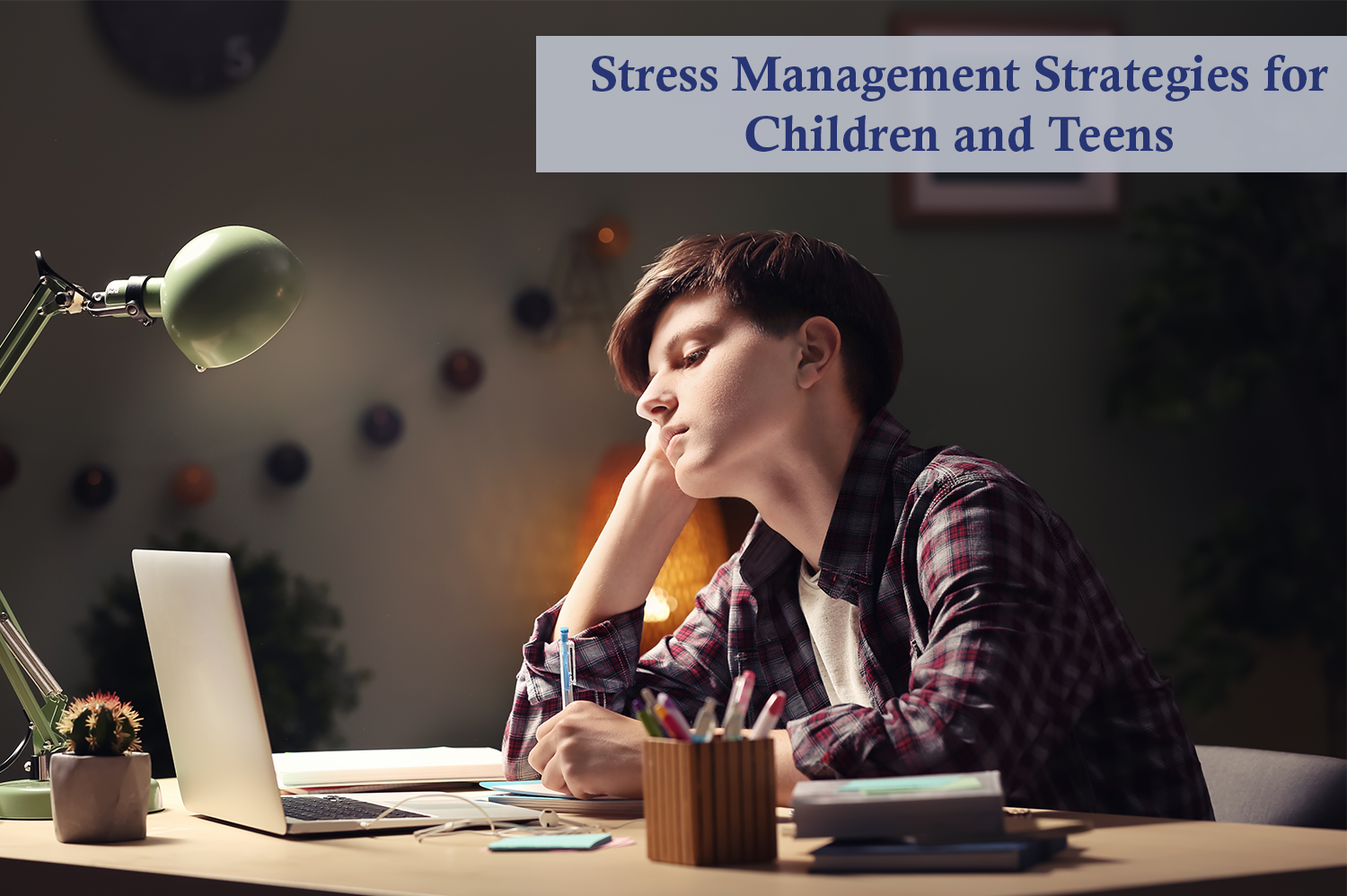Stress is a fact of life, but it can sometimes be difficult for children and teens to manage it. Help your child handle stress by learning of a few stress management strategies to guide them.
Stress: Why it Can be Problematic
Stress is the physical or mental response to an external cause, like having an illness or completing a big project. It’s a normal part of life, and everyone experiences stress. In some circumstances, stress can be good, as it can help motivate to get things done.
However, too much stress or chronic stress can lead to emotional and mental symptoms like irritability, sadness, anxiety, and depression. It can also have physical symptoms, as prolonged stress can cause high blood pressure, weaken the immune system, and contribute to diseases such as obesity and heart disease. When children and teens don’t find proper stress management strategies to help them, it can have lasting effects.
Many situations can cause stress in children and teens. Some include:
- Family conflict
- Relationships with friends or romantic relationships
- Life changes, like leaving schools or moving houses
- Big decisions, like deciding whether to talk about something important or sensitive
- Schoolwork and exams
- Too many things to do or feeling overwhelmed by tasks
- Lack of sleep
Stress vs. Anxiety
Stress and anxiety can seem very similar. After all, they share quite a few emotional and physical symptoms – uneasiness, tension, headaches, high blood pressure, and loss of sleep, to name a few. While stress can be a trigger for anxiety, they are different and have different origins. It’s important to know the differences so you can help your child properly the right way.
Stress is generally a response to an external cause. This could be an exam coming up at school, having an argument with friends, or applying to colleges. Stress usually subsides once the situation has been resolved. Because stress is caused by external factors, tackling these head-on can help.
Anxiety is generally a person’s specific reaction to stress and its origin is internal. Anxiety is typically characterized by persistent worry or dread in situations that aren’t typically threatening. Unlike stress, anxiety persists even after the concern has passed. Those with anxiety will benefit most from seeing a mental health professional.
Signs of Too Much Stress
It’s important to be aware of the signs of stress in children and teens so you can provide help early on. When children and teens have too much stress, they could have:
- Trouble sleeping – a child or teen might complain of feeling tired all the time or have trouble falling asleep at night.
- Changes in behavior – A child who used to be a good listener is acting out; a once-active teen isn’t interested in leaving the house. Sudden changes can be a sign stress levels are high.
- Irritability and anger – Stressed-out kids and teens might be short-tempered and more argumentative than normal.
- Eating changes – Eating too much or too little can be a reaction to stress.
- Getting sick more often – Signs of stress can show up as physical symptoms, like headaches or stomachaches.
Stress Management Strategies:
Stress management is important for children and teen mental health and wellbeing. Help your child healthily manage stress with these tips.
Set Good Sleep Habits
Sleep is essential for physical and emotional well-being. Experts recommend nine to 12 hours of sleep a night for 6 to 12-year-olds, and teens need eight to 10 hours a night. Since stress can disrupt sleep, it’s important to help your child combat it and get the full amount of sleep they need. Try to help them limit screen use at night and suggest activities that will promote sleep right before bed, like taking a hot shower or reading a book.
Discuss Social Media Limits
Children and teens are growing up in very different times. They spend a lot of time online, where they can easily run into questionable content, cyberbullying, and peer pressure. Peer pressure can be especially difficult to handle, as your child is getting messaged, texted, and tagged day and night. They might feel obligated to respond immediately for fear their friends will be mad at them.
As a parent, you can help teach your child to be a savvy digital consumer and set social media limits. Suggest establishing “social media free” hour(s) and explain if your child tells their friends upfront when they won’t be available, their friends won’t be surprised when they don’t respond. If they’re reluctant, try getting them to take baby steps, like unplugging for half an hour, or unplug with them. Set both of your electronics aside and do something together for an hour or two.
Combat Negative Thinking
When stressed, children and teens can fall into the negative thinking trap. Thinking things like “I’m terrible at writing,” or “I’ll never make the team, why even try?” can send your child into a spiral of negativity. When your children use negative-self talk, don’t just disagree. Ask them to think about what they said and whether what they said is true. If they’re still getting stuck in negative thinking, remind them of times they worked hard and improved. Learning to frame things positively will help them build up their resilience to stress.
Brainstorm Stress-Relieving Distractions
Enjoyable activities provide a fantastic distraction for the brain, which helps relieve stress. So, help your child figure out how they can incorporate fun stress-relieving activities into their days. Whether it’s painting, playing an instrument, or shooting hoops, get them to pick out activities they enjoy. No matter what it is or how briefly they do it, your child will have some distractions they can come back to when they need it.

Let us help your child or teen with stress management strategies.
When to Seek Help
If your child is struggling to manage stress despite trying these techniques, stress is impacting their daily function, or their mental health is worsening, it’s time to seek help. Mental health professionals can get to the root of the stress and help your child build the best stress management strategies and skills for them.
At Equity Associates, we are ready to provide the care your child or teen needs. Our therapy services are highly personalized for one’s unique needs, and with our usage of telemental health, those seeking treatment can do so in the comfort of their home. We’re based in Ridgway, Colorado but can help those anywhere in the state. No matter what, we’re always here to support those who need us.






